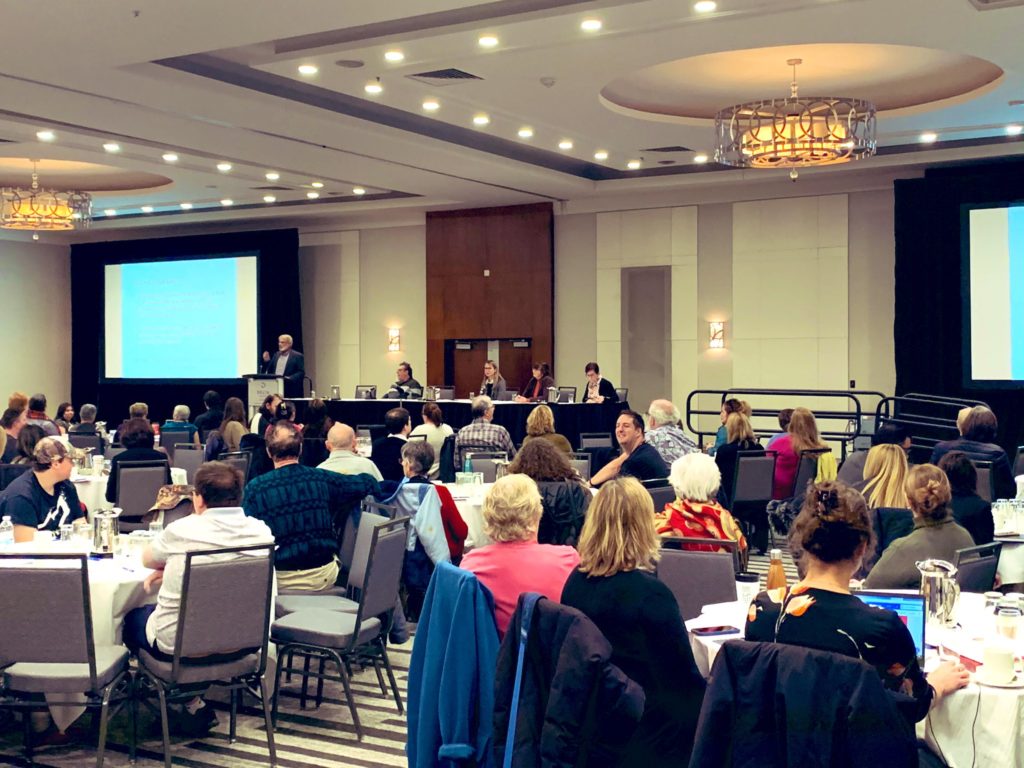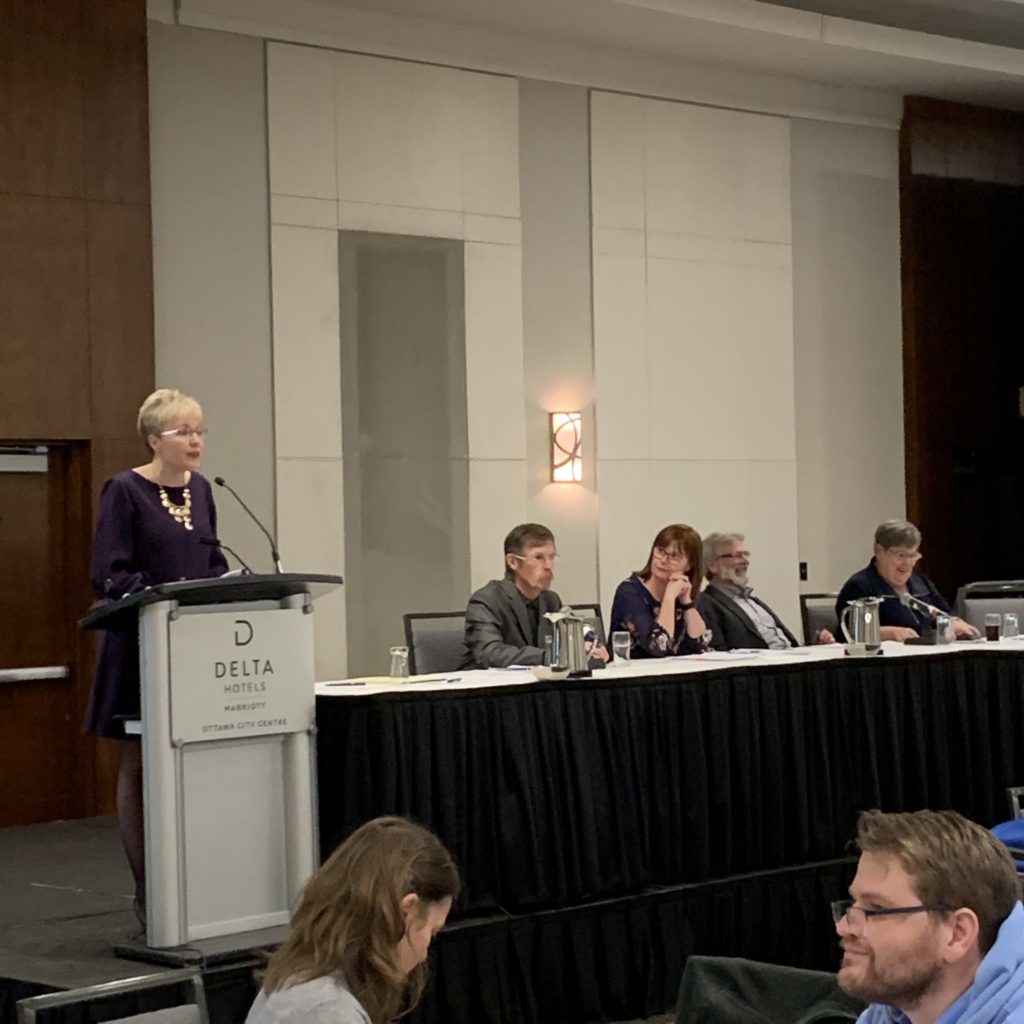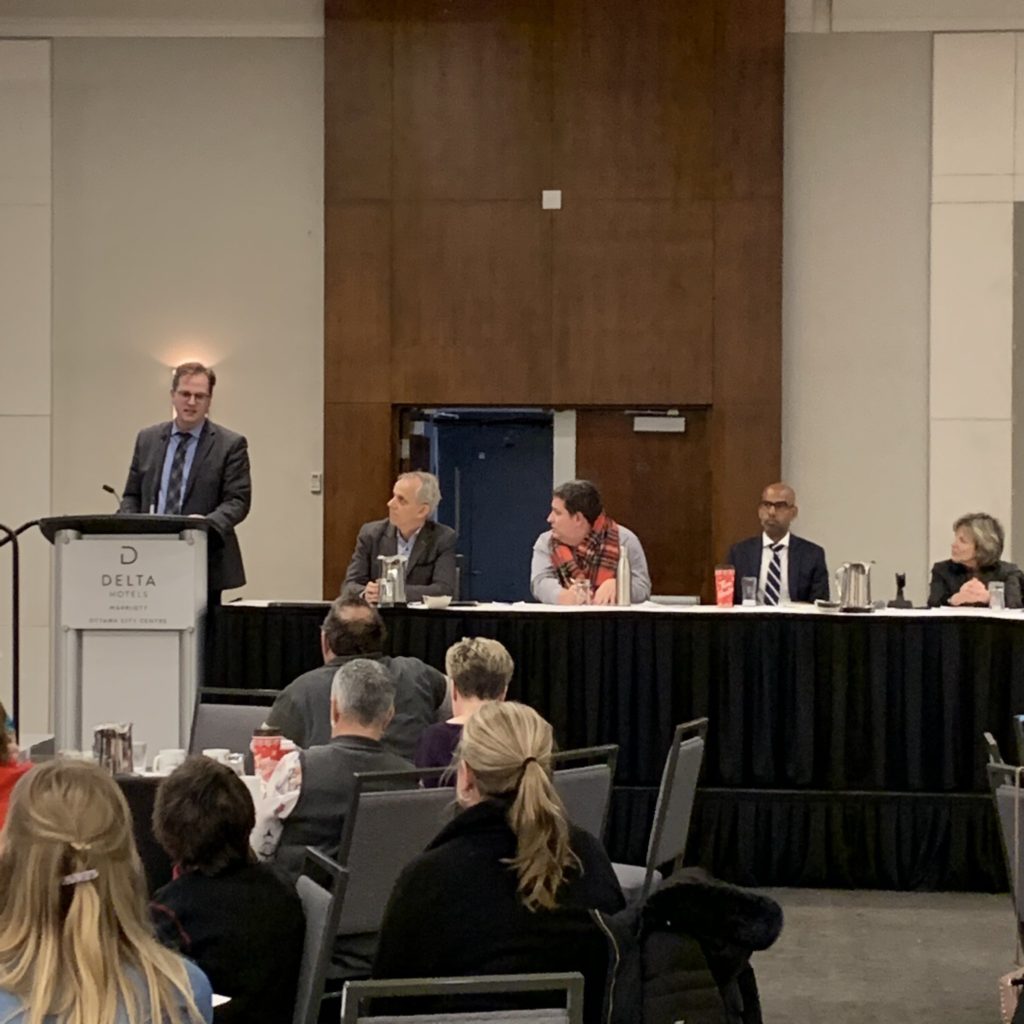Inclusion Canada and People First of Canada (PFC), in collaboration with the Office for Disability Issues, Employment and Social Development Canada, hosted the 10th Annual Federal Policy Forum on Inclusion in Ottawa on December 2, 2019. This year’s theme was Why am I poor? Decreasing poverty & increasing opportunity for people with an intellectual disability.
Celebrating our 10th year, this year’s event introduced two new features: a keynote speaker and interactive breakout sessions following each panel presentation. Building on feedback received from previous forums, these elements were added to offer participants an opportunity to network, engage, and contribute insights, lived experience and expertise to the discussion. We believe innovative solutions are best developed together, and we’re pleased to present some of the themes that emerged during this year’s discussions.

The morning began with opening remarks from Kory Earle, President of People First of Canada and newly elected Inclusion Canada President, Robin Acton. The keynote address, offered by Neil Belanger, Executive Director of the British Columbia Aboriginal Network on Disability Society (BCANDS) provided insight into the reality of life for indigenous people with a disability in Canada, inequalities in access to services and supports, and new initiatives and next steps in improving life for people with a disability.
Panel 1 Transitioning from Sheltered Work to Employment First: Reflections from the Front Line

The first panel of the day discussed the process of transitioning from congregate work environments to inclusive employment offering real work for real pay. Stories of lived experience were shared by a self-advocate and parent, followed by reflections from a service agency. Research being done examining the reality of sheltered work in Canada was also presented.
Breakout session number one invited participants to reflect on the top barriers and solutions to transitioning from a sheltered model to an employment first service model. Discussions overwhelmingly highlighted two key barriers:
- fear of change, and
- attitudes toward people with an intellectual disability.
Many participants felt that fear was a key component preventing the transition from sheltered work to inclusive employment. This fear presents itself in different ways and is experienced by multiple people. Service providers may be fearful that a change to employment first will mean a loss of jobs for agency workers. They may worry about how to resource this new model of support, both from a financial and human resource perspective.
Similarly, parents and family members may be fearful about a transition to employment first. For those who have never experienced anything but congregate, segregated environments, the idea of inclusive employment can be daunting. Worries about safety, losing existing social connections, and transportation abound. This is further complicated by concerns about how employment will impact financial and health benefits.
Fear among employers, such as how to accommodate a disability, or how to deal with performance issues also result in barriers to creating opportunities for inclusive employment.
Breakout session participants identified attitudes toward people with an intellectual disability as going hand-in-hand with the fear described above. Participants felt that many societal, employer and service provider attitudes are still grounded in a deficits approach to disability – focusing on what individuals cannot do rather than their strengths, abilities, interests and talents. They commented on the bias, stigma and misinformation that continues to surround people with an intellectual disability.
Many of the solutions proposed for addressing both fear and attitudes were common. They included:
- More education and awareness focused on the capabilities of people with an intellectual disability
- Providing examples of successful transitions that can be used for inspiration and as a roadmap for creating similar transformation in other settings. Exposing individuals, families, staff and communities to new options and possibilities is crucial. As one participant put it: “You don’t know what you don’t know!”
Among these suggestions were calls for system-level change that would offer better legal protection (employment standards) for people with an intellectual disability, require the government to stop funding sheltered or congregate environments, and implement changes to ensure people retain needed benefits while they are working.
When asked to identify the supports that service agencies need to make the transformation to employment-first, responses included:
- Having access to someone external who can help the agency to plan and navigate the transition process
- Having strong Board leadership, a clear vision, and commitment to shifting the workplace culture. This can be supported by passionate, vocal parents committed to motivating the leadership.
- Having access to stable and predictable funding to help ensure sustainability as agencies transition to an employment first model. Greater access to individualized funding is also crucial.
- Training agency staff in the philosophical shift and the new skillsets required to move from sheltered work to inclusive work. This includes education on the United Nations Convention on the Rights of Persons with Disabilities (CRPD) and having toolkits with examples of other agencies who have transitioned to employment first, their process, success stories and examples of what is possible.
- Having enough staff who can effectively support the work being done (planning, job coaching, etc.).
- Training for staff, families and leaders on person-centered planning, and how to ensure the individual and their wants and dreams are central to the planning process.
Panel 2: Inclusive Employment: Real Work for Real Pay

Panel two explored the impact that having a job makes on the financial security of people with an intellectual disability. A discussion of the Accessible Canada Act’s commitment to inclusive hiring was followed by a self-advocate and family member offering personal experiences and insights. This panel also included a presentation of the Ready, Willing and Able initiative.
During the second breakout session, participants were asked about the barriers that keep people with an intellectual disability out of the labour market. Not surprisingly, discrimination, stigma and misinformation among employers re-emerged as a significant barrier. Participants also identified a variety of other issues standing in the way of inclusive employment. They include:
- Claw backs to government benefits (income or health benefits) as a result of employment income
- Lack of public transportation, especially in rural areas
- Lack of accommodations and on the job support
- Inaccessibility of technology (online job applications)
- Union inflexibility/protectionism
Participants also spoke to the interconnectedness between unemployment, poverty, food insecurity, housing insecurity and homelessness. Finding and maintaining employment is exponentially harder when you live in precarious housing, can’t afford clothing or workplace tools and equipment, and lack access to nutritious food.
In addition, participants felt that the way people with an intellectual disability are prepared for the labour market has a huge impact on the success of inclusive employment. Participants expressed concerns about segregated schooling, stipends, use of volunteerism in place of paid work (as a way to gain experience), and the focus placed on the need for pre-employment training as a prerequisite to getting a job. Overall, the focus on people with disabilities as “special” or separating them from mainstream pathways to employment often creates additional barriers. As one group commented, “people hire who they know”. Ensuring that people with disabilities build strong social networks, take part in typical employment experiences (part-time and summer jobs), and experience a full, rich, inclusive education are keys to employment success.
Given the part-time, insecure and sometimes temporary nature of the jobs held by people with an intellectual disability, participants were asked about solutions to ensure people’s basic income needs are met. Ideas included:
- Removing income assistance claw backs on earned income or allowing higher exemptions.
- Allowing individuals to maintain access to provincial healthcare benefits unless the employer offer health benefits.
- Introducing universal Pharmacare.
- Reducing other costs (such as public transportation costs, or doctors’ fees for completing forms like the Disability Tax Credit application).
- Redesigning the Disability Tax Credit to be make the application process more accessible and the credit more beneficial (such as a refundable benefit).
- Redesigning income support programs to be more flexible and responsive to the needs of people with disabilities (ability to slide on and off benefits programs as needed – Employment Insurance, Income Assistance). One group described the need for a social safety ‘trampoline’ rather than a safety ‘net’ – instead of catching people in a net and having them stay there, a trampoline cushions their fall and tosses them back up again!
- The creation of a National basic guaranteed income (or universal basic income) that would factor in disability costs.
- Greater access to supports that will allow people to secure and maintain employment.
- Exploring self-employment as a viable option, including for people with more significant or complex disabilities.
- Applying a disability lens to the issue of income security, and a rights-based approach to all supports for people with disabilities.
Participants felt that unions and governments hold powerful roles in committing to hiring people with an intellectual disability and encouraging others to do the same. Having employers role modeling what is possible is crucial in showcasing not just individual success but the ability to make systemic change. Participants also expressed the importance of early access to information, quality inclusive education that prepares students for the labour market, and post-secondary opportunities.
Panel 3: Income Security Tools: Exploring the Registered Disability Savings Plan, the Disability Tax Credit and the National Poverty Reduction Strategy

In panel three speakers discussed various financial tools designed to support the economic wellbeing of people with an intellectual disability. The benefits and barriers associated with the Disability Tax Credit (DTC) and Registered Disability Savings Plan (RDSP) were discussed by a self-advocate, family member and professional. The panel concluded with a presentation on Canada’s Poverty Reduction Strategy.
During the last breakout session, participants were asked to consider what could be done to make existing income security tools (DTC, RDSP, Income Assistance) more accessible and useful for people with an intellectual disability. They were also asked to identify other types of tools that could enhance the economic security of people with an intellectual disability. Participants had a variety of ideas for making income tools more accessible and useful, such as:
- Removing the medical aspect of the DTC.
- Replacing eligibility criteria on application forms with measures that recognize the unique reality of intellectual disability.
- Converting the DTC into a benefit (payment) rather than a tax credit.
- Expanding the list of medical professionals who can complete DTC application forms to include people in positions of trust who know the individual well (occupational therapist, social worker, etc.).
- Removing the cost of documentation to have DTC forms completed by a health professional.
- Offering ways to complete the DTC application online through the Canada Revenue Agency’s MyAccounts portal.
- Offering incentives at the provincial level to individuals who open an RDSP and integrate financial tool discussions into planning meetings.
- Removing requirement to re-quality for the DTC.
- Simplifying application forms for the DTC and RDSP and offer them in accessible formats (plain language, large print).
- Providing visual information (flowchart) showing the other benefits that become available once a person has qualified for the DTC.
- Offering more support and resources to assist with completion of application forms and marketing the availability of this assistance. Consider offering a tax incentive to organizations who assist people with disabilities to apply (accountants, financial advisors, community organizations supporting people with disabilities).
- Modifying withdrawal rules to allow people to access assets in their RDSPs sooner.
- Simplifying the process for filing income taxes, since many financial tools are tied to filing annual returns.
- Implementing broad public awareness campaigns to promote income tools both online and offline (posters, brochures, radio, YouTube videos, etc.)
- Increasing income assistance to reflect the cost of living.
- Creating a Canada-wide basic guaranteed income.
We would like to express a sincere thank you to the families, self-advocates, government representatives, policy makers, and community advocates who made this policy forum on inclusion a collaborative space for learning and growth. Your engagement in the day’s discussions, thoughtful comments and suggestions have allowed us to identify existing barriers and continue on the road to innovative solutions.
PowerPoint presentations from the 10th Annual Federal Policy Forum on Inclusion can be downloaded here.
